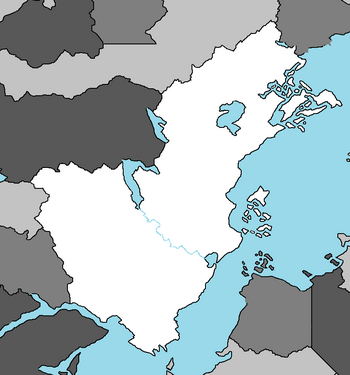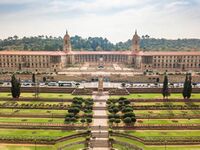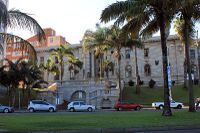Timeria
Kingdom of Timeria Timeria | |
|---|---|
| Motto: "Aim ever higher" | |
| Anthem: Forever Royal anthem: For Our People | |
 Timeria, 2020 | |
| Capital | Infinity |
| Largest | Osea |
| Official languages | English |
| Other type of languages | Other languages list |
| Demonym(s) | Timerian |
| Government | crowned republic |
• Monarch | Kaz Malyna |
| Aneya Raso | |
| Malaya Heard | |
• Speaker of House | Liam Grey |
| Area | |
• | 1,269,345 sq mi (3,287,590 km2) |
| Population | |
• 2023 census | 128 Million |
| GDP (nominal) | 2023 estimate |
• Total | ❖6.21 Trillion |
• Per capita | ❖48,515 |
| Gini (2020) | 40.2 medium |
| HDI (2020) | very high |
| Currency | Bean (BT) |
| Time zone | UTC+N, where N is number of hours |
• Summer (DST) | UTC+N, where N is number of hours |
| Antipodes | countries or islands antipodal to this one |
| Date format | mm/dd/yyyy |
| Driving side | right |
| Calling code | +5 |
The Kingdom of Timeria, also known as Timeria is a sovereign state in Western Adula. It is bordered by Kantoalina, Azil, Cakala, Aybrea, Wyomia, and Somodi to the west, Artegana to the north, and the Albarine Sea to the east, with maritime borders with Austrolis, Peoratia, New Elkland, and Unified Sera. Timeria spans 1,269,345 mi² and has a total population of 121 million, making it the 11th most-populous nation in the world. It is a constitutional monarchy, with its capital located in Infinity and the largest city being Osea. The Constitution of Timeria establishes the state as secular and democratic, with the current President being Aneya Raso.
The history of Timeria dates back almost 40,000 years with signs of early human civilization, such as some of the earliest bronze tools discovered. One of the oldest known civilizations in world history, for instance, were the Una people who lived deep in rainforests and adapted to the harsh environments, establishing early kingdoms and nation states. The post-classical Timeria was consistent of a rising unitary state on the west coast of the Albarine Sea, with relative isolation from much of the world allowing for sporadic growth, but with key oceanic trade networks spurring development. Timeria emerged as a regional power in the Barretoan Wars of the 1830s, and became more influential in their involvement in international affairs through the 20th century. Experts generally agree that Timeria became most influential in the 21st century with rising economic strides made through its involvement in the Trans Adula Fair Commerce Accord (TAFCA).
Timeria is a highly developed free market economy, with significant sectors in technology, tourism, manufacturing, and energy production. The nation's GDP is estimated to be around 6.21 trillion, with a GDP per capita of 48,515, regarded as the 4th largest economy in the Coalition of Crown Albatross. As a world leader in industrial and technological sectors, as well as a high Human Development Index rating, it is considered a major power and one of the most influential nations in Adula and the world thanks to widespread international investment. It is a founding member of the Pan-Adulan Defense Coalition, Trans Adula Fair Commerce Accord, and the C21.
History
Prehistory
Early Clans and Unification
The Era of Clan Rivalries
In the ancient lands that now constitute modern-day Timeria, ten distinct clans held sway over their respective territories, each defined by a unique warrior culture and system of governance. These clans—Uchiha, Senju, Otsutsuki, Uzumaki, Nara, Hatake, Karatachi, Ryu, Izuno, and Akimichi—engaged in frequent conflicts as they sought dominance over fertile lands and strategic locations. The Uchiha and Senju clans were particularly prominent, with their rivalry dominating the political and military landscape of the region. Both clans fought for control over what is now the Forever and Ryxyns Coast regions of present-day Timeria. Their battles were characterized by intense skirmishes and periodic large-scale confrontations, with each clan seeking to expand its influence at the expense of the other.
The Role of the Bezdekia Road
The Bezdekia Road, a crucial trade route that traversed the region, became a focal point of conflict during this era. Clans often conducted raids on merchants and travelers using the road, seeking to control the flow of goods and resources. These raids were not only economically motivated but also served as a means to assert dominance and gain prestige among rival clans. The Uchiha and Senju clans, in particular, utilized the road as a strategic asset in their ongoing struggles, leveraging their control over it to disrupt the supply lines of their adversaries. The road's significance in trade and warfare further fueled the fierce competition between the clans.
Colonial Period and Independence
The Julian Empire’s Influence During the height of its power, the Julian Empire extended its reach into the southern regions of Timeria and the Aquarii Islands. From its inception in 2 BCE, the Julian Empire had established itself as a dominant force on the Adulan continent, known for its expansive territory, advanced administration, and military prowess. The empire’s colonization of Timeria’s southern territories was part of its broader strategy to control key trade routes and resource-rich areas. This period of colonial rule saw the imposition of Julian administrative systems, cultural practices, and economic policies on the Timerian lands. The Julian presence significantly impacted Timerian society, introducing new governance structures and altering traditional social norms. Despite the empire’s efforts to integrate Timeria into its vast domain, local resistance and cultural differences remained prevalent.
Resistance and Revolt
As the Julian Empire faced internal and external pressures, Timerian resistance to colonial rule grew stronger. Various Timerian factions, including local leaders and emerging nationalist groups, began to organize against the Julian administration. The resistance was characterized by both diplomatic efforts and armed conflict. Guerilla warfare and uprisings in key regions, particularly in the southern territories and the Aquarii Islands, intensified as Timerians sought to reclaim their autonomy. The Julian Empire’s ability to maintain control weakened over time, leading to increasing unrest and instability in the colonized regions. By 720 CE, the Julian Empire’s declining influence and the relentless resistance from Timerian forces culminated in a successful rebellion, driving the empire out of Timeria and restoring local governance.
Formation of the Merian Unity
Amidst the widespread clan warfare, a significant shift occurred with the formation of the Merian Unity. This alliance brought together the Nara, Hatake, and Karatachi clans from the southern Meria region. These clans recognized the benefits of collaboration over constant warfare and sought to create a more stable and prosperous society. The Merian Unity played a pivotal role in ending the internecine conflicts that had plagued Timeria for centuries. Through diplomatic negotiations and mutual agreements, the southern clans established a framework for cooperation that laid the groundwork for broader regional stability. This alliance fostered cultural exchange, economic growth, and the gradual cessation of hostilities among the participating clans.
The Transitional Period (772-797 CE)
The period between 772 and 797 CE was marked by significant transformation as Timeria transitioned from a state of perpetual warfare to one of relative peace and unity. During this transitional period, various clans began to recognize the advantages of regional cooperation and the potential for economic development. The cessation of hostilities allowed for the spread of cultures, technologies, and commerce across Timeria. This era saw the emergence of new trade networks, advancements in agriculture, and the growth of urban centers. The gradual decline in clan rivalries set the stage for the eventual unification of Timeria under a single rule, as the clans focused on rebuilding and expanding their influence through peaceful means rather than conflict.
The Rise of King Jordan and Unification Efforts
The unification of Timeria was brought to fruition by King Jordan, a charismatic and strategic leader who emerged from humble beginnings. Unlike traditional royalty, Jordan was a renowned warrior who had risen to prominence through his military prowess and leadership. His union with the daughter of the powerful Chief of the Senju clan played a crucial role in ending the longstanding feud between the Uchiha and Senju clans. This marriage not only secured a lasting peace between the two clans but also established a foundation for broader unity across Timeria. Jordan’s leadership was instrumental in persuading other clans to join the unified Timerian state, culminating in a comprehensive campaign against the remaining dissenting clans, including the Otsutsuki. The successful integration of these clans and regions under one Timerian crest marked the beginning of a new era of stability and prosperity for the nation.
Modern History
Early in the modern era, many foundations of modern Timerian society were formed. Many had expected the union to fall apart after the death of King Jordan, but the nation had continued to progress with relative avoidance of political instability. Most of the Timerian growth was uninterrupted as many developing nations and fledgling empires were focused in East Adula and Euronia. However, in 1830, Timerian naval power participated in coalition activities at the helm of the Barretoan Wars and assisted in battling Skithan imperial fleets in the Emmiria Sea.
In the aftermath of the Barretoan Wars, Timeria, along with Unified Sera and the Central Adulan nations, saw a rise in economic prominence. Timeria's navy became the most formidable force in the Albarine Sea, reflecting the nation's growing influence and capabilities.
The 19th century was a transformative period for Timeria, transitioning from an agrarian economy to a market-based economy. This period, known as the "Industrial Dawn," laid the foundation for Timeria's industrial growth and economic diversification. The World War further accelerated Timeria’s industrialization, with the nation emerging as a key producer of arms and goods. In 1951, Timeria committed support to the Allied Forces in the World War in the form of supplies, small detachments of fighter squadrons, and expeditionary troops. Across Timeria production increased and manufacturers worked to meet the demands of the allied forces. Dragonwater became the production capital as the city produced over 1/4th of all exports. Dragon Manufacturing led other manufacturing through its groundbreaking manufacturing methods and efficiency. Despite facing a severe recession in the 1970s, Timeria's economy was revitalized by President Sean Grey’s "21st Century Timeria Initiative," which focused on modernization and innovation. In 1978, Timeria joined the Coalition of Crown Albatross.
21st Century
On May 6th, 2011, Timeria became a founding member of the Trans Adula Fair Commerce Accord, an economic alliance that incentivized international cooperation in Adula.
In 2021, Timerian forces were deployed internationally in several nations. They operated in Azil in response to threats from the SHADOW syndicate, in Kossmil following terrorist attacks in Dabatta, and in Birat and Estoca at the outbreak of the Birat Civil War.
Geography
Timeria, with a total land area of 1,269,345 square miles, is a geographically diverse nation. The country is defined by its large bodies of water and intricate river systems. Notable among its lakes are Lake Lotus, Lake Noana, and Emerald Lake, each playing a significant role in the country’s geography and ecology. Lake Lotus, the largest lake, is centrally located in Northern Timeria, while Lake Noana and Emerald Lake are situated along the western border with Somodi, nestled between the Selumna and Kirvista mountain ranges.
Five major rivers traverse Timeria’s varied landscapes. The Athacona River flows from Lake Noana through central and southern Timeria, eventually emptying into Tianshen Bay. The Aurelian River originates in the Kirvista Mountains, flowing directly into the Albarine Sea along the eastern coast. The Maradan River starts from Emerald Lake, flowing through northern and central Timeria and also into the Albarine Sea. The River Nyrel cuts through the Selumna Mountains, feeding into Lake Noana, while the Sorvain River skirts the southern edge of these mountains, feeding directly into the Athacona River.
Timeria's eastern coast is bordered by the Albarine Sea, while the southern edge is bordered by the Sea of Austrolis. The geography is further characterized by its two significant island chains, the Leo Isles and Aquarii Islands, both located in the Albarine Sea off Timeria's east coast.
The geography of Timeria is characterized by diverse landscapes and natural features, ranging from dense rainforests to expansive coastlines. Situated in the heart of the Adula continent, Timeria shares borders with several neighboring countries Azil, Kantoalina, and Somodi along its western border, Artegana to the north, and maritime borders with Austrolis in the south.
The Leo Isles consist of 18 major islands, the biggest being Alaraine. While most of these islands are unpopulated Arianna sits on Melirane and is home to 4 million people. These islands are similar to the Northern Region but are less mountainous.
Climate
The climate in Timeria is as diverse as its geography, ranging from tropical and subtropical to equatorial across its regions. Rainfall varies, averaging between 39 and 50 inches annually. The northern regions experience a tropical climate with high temperatures and heavy rainfall year-round. This results in dense rainforests that make Northern Timeria a biodiversity hotspot.
Central Timeria serves as a transition zone between the tropical north and the temperate south, characterized by river plains and mixed vegetation. Rainfall in this region is moderate compared to the north, and the area supports a blend of forests and savannahs.
In the south, the climate is more temperate with distinct dry and wet seasons. Southern Timeria features less dense forests and savannahs, with temperatures generally warmer. This area supports diverse wildlife adapted to drier conditions. Timeria also experiences a monsoon climate, bringing humidity during the summer and drier conditions during the winter months.
Biodiversity & Environment
Timeria boasts a rich tapestry of biodiversity and diverse ecosystems, owing to its varied geographical features and climatic zones. From lush rainforests to expansive savannahs, the country is home to a multitude of plant and animal species, many of which are endemic to the region.
The Kirin Rainforest with large mammals such as Jaguars, and types of monkeys. The rainforest also boasts a huge amount of plant life like Kapok trees, rubber trees, and exotic plants like Heliconia.
There are also a number of coral reefs in Timeria like Nilan's Reef off the coast of Leo Island. Many sea animals live in the waters around Timeria including Angel sharks, Hawkfish, and reef octopus. The greatest predator off the coast of Timeria are Great White Sharks. The Albarine Sea produces one of the world's most biodiverse regions, and Timeria's coasts are particularly diverse thanks to sediment runoff from river deltas.
Landscape
The landscape of Timeria is characterized by a gradual increase in elevation from east to west. The eastern regions are more coastal and low-lying, while the western regions are dominated by mountain ranges such as the Kirvista and Selumna Mountains. These mountains form natural barriers and are vital sources of the major rivers that flow across the country.
Demographics
The demographics of Timeria reflect its status as one of the most populous nations on the continent of Adula. As of the latest census, Timeria boasts a population of approximately 121,322,000 inhabitants, positioning it as the 11th most populous nation globally and the fourth most populous on the continent, following Cadair, Vitosium, and Emmiria. With a total land area spanning 1,269,345 square miles, Timeria maintains a moderate population density of approximately 95.6 people per square mile.
The ethnic composition of Timeria is diverse, with the majority of the population identifying as Timerian, constituting about 62% of the total populace. Additionally, a significant portion of the population, roughly 38%, comprises individuals hailing from various regions across Adula and Iearth. Notably, a considerable number of individuals trace their ancestry to Sera, particularly from South Adula. This ethnic diversity enriches Timerian society and contributes to its cultural vibrancy.
Population
Timeria has a population of 121,322,000, making it the 11th most-populous nation in the world, as well as the fourth most-populous nation on the continent of Adula behind Cadair, Vitosium, and Emmiria.
Urbanization and Migration
Timeria exhibits a pronounced trend toward urbanization, with approximately 77% of the population residing in urban areas. The nation's vast rainforests concentrate populations into cities, fostering urban development and economic growth. Moreover, Timeria experiences significant migration flows, particularly between Timeria and Sera. This movement of people between the two nations contributes to cultural exchange and economic integration, further shaping Timeria's demographic landscape.
Religion
The Constitution of Timeria guarantees the free exercise and protection from persecution.
The Sky Faith is the most common religion in Timeria with about 42% of the population affiliating with the religion. The religion was started by ,
Islam makes up 9% of the population. Much of Islam's presence in the country can be traced back to explorers and immigrants from the Emmirian Empire, with diasporas of East and Southern Adula's muslim-majority nations having integrated into Timeria's society.
Christianity follows closely behind at 5%, largely stemming from orthodox groups in Central Adula. In particular, Durnstaal and Elkland diasporas contributed to Christianity's sizable population in Timeria. Other Christian denominations of significance include Verdusan Catholicism and the Church of Zian.
Politics
Government
The government of Timeria is a democratic system comprising three branches: the executive, legislative, and judicial branches. These branches work together to ensure the smooth functioning of the country and the protection of Timerian values. With a diverse political landscape consisting of five major parties, Timeria prides itself on its commitment to democratic principles, freedom of speech, and upstanding values.
Executive Branch The executive branch of the Timerian government is led by the President, who serves as the head of state and government. Currently, President Aneya Rasoand, a member of the Democratic Union, holds this esteemed position. The President is elected through a democratic process and represents the interests of the Timerian people. The executive branch is responsible for implementing and enforcing laws, managing foreign affairs, and overseeing the daily administration of the country.
Legislative Branch The legislative branch in Timeria is responsible for making laws and representing the interests of the citizens. It consists of the Congress, which is composed of elected representatives from the five major parties. However, the Congress is predominantly composed of members from the largest party, the Democratic Union, which holds the majority of seats. This party embraces moderate ideologies and embodies the traditional Timerian values. Other major parties include the Universal Rights Group, the Collective Egalitarian Party, the Unified Right Party, and the Social Nation Group.
While the Democratic Union holds the most extensive base and includes both left-leaning and right-leaning members, the Universal Rights Group stands out as the most liberal and progressive party. Particularly popular among the younger population, the URG champions progressive policies and ideals.
The Collective Egalitarian Party represents various niche political interests, such as environmentalists and pacifists. Although they have never held the majority in Congress, their support is crucial for passing legislation, making them a significant partner party.
The Unified Right Party, on the other hand, embodies conservative ideologies and mainly attracts populists from smaller communities. Their focus lies in reducing the government's role in citizens' lives and minimizing government spending to provide tax breaks for Timerian citizens.
Lastly, the Social Nation Group represents the leading Socialist Party in Timeria. Although they are the smallest among the five major parties, their representatives often enjoy popularity among the population. Their core objectives include safeguarding government programs and ensuring that businesses operate within responsible boundaries.
Judicial Branch The judicial branch in Timeria upholds the rule of law and ensures the fair and impartial administration of justice. It is responsible for interpreting and applying the laws of the country. The judiciary is independent of the other branches of government and consists of a system of courts headed by the Supreme Court. Justices are appointed based on their legal expertise and are tasked with resolving legal disputes, protecting individual rights, and ensuring the constitutionality of laws.
Overall, Timeria's government is built upon the principles of democracy, freedom of speech, and upstanding values. The three branches work together to ensure a balance of power and represent the diverse interests of the Timerian people. With a political landscape consisting of multiple parties, Timeria strives to maintain a democratic process that upholds the rights and aspirations of its citizens.
Administrative Regions
Timeria is divided into 10 administrative regions. Each region has power granted to it from the federal government. Each region has its own government which can operate within Federal constraints. Powers include maintaining a police force and well-maintained militia, collecting taxes, holding elections, and regulating commerce.
Each district has 10 Senators and a number of Representatives based on population that represent them in Federal government.
Timerian Regions
| Largest urban areas of Kingdom of Timeria 2020 National census | |||||||||
|---|---|---|---|---|---|---|---|---|---|
| Rank | Region | Pop. | Principal settlement
| ||||||
| 1 | Ishaana Region | 37,784,325 | Osea | ||||||
| 2 | Rynx Coast Region | 25,603,450 | Infinity | ||||||
| 3 | Forever Region | 19,230,093 | Mai | ||||||
| 4 | Maleia Region | 14,859,791 | Dragonwater | ||||||
| 5 | Astin Region | 7,448,903 | North Kai | ||||||
| 6 | Crystalholt Region | 5,075,964 | Rosecoast | ||||||
| 7 | New Crest Region | 5,449,864 | Sunset City | ||||||
| 8 | Kirin Region | 4,888,375 | Gracemeria | ||||||
| 9 | Leo Isles Region | 3,219,872 | Arianna | ||||||
| 10 | Aquarii Region | 1,700,503 | Lua | ||||||
Foreign Relations
The foreign relations of Timeria play a crucial role in shaping the country's global standing and fostering international cooperation. Timeria actively participates in various international organizations and maintains diplomatic ties with numerous nations across the globe. Guided by the principles of peace, cooperation, and economic development, Timeria strives to promote international harmony and mutual understanding.
Membership in International Organizations
Timeria is a member of several influential international organizations that serve as platforms for global collaboration and addressing common challenges. These organizations include:
Coalition of Crown Albatross (CCA): Timeria is an active participant in the Coalition of Crown Albatross, a region and intergovernmental organization with a global reach. The CCA's primary objectives are to maintain international peace and security, foster friendly relations among member nations, promote economic and human development, and serve as a center for harmonizing the actions of nations. Timeria's membership in the CCA allows the country to contribute to global peacekeeping efforts and engage in meaningful dialogue with other member nations.
Trans Adula Fair Commerce Accord (TAFCA): Timeria is a founding member of the Trans Adula Fair Commerce Accord, an international trade agreement among a select group of member countries. The accord aims to reduce trade barriers, import quotas, and tariffs, while promoting liberalization of trade in services and increasing trade of goods and services among the member nations. Timeria's participation in TAFCA underscores its commitment to promoting fair and open trade practices, benefiting both Timerian businesses and the economies of its partner nations.
Coalition Trade Organization (CTO): Timeria actively engages in the Coalition Trade Organization, which focuses on regulating trade in goods, services, and intellectual property among participating countries. The CTO provides a framework for negotiating trade agreements and a dispute resolution process aimed at enforcing adherence to CTO agreements. By participating in the CTO, Timeria seeks to enhance trade relations, promote economic growth, and ensure a fair and transparent trading system that benefits all member countries.
C21: Timeria is a member of C21, an intergovernmental forum comprising 21 countries. C21 addresses critical global issues related to the economy, international financial stability, climate change mitigation, and sustainable development. The forum includes both industrialized and developing nations, fostering dialogue and collaboration to find comprehensive solutions to pressing global challenges. Timeria's involvement in C21 reflects its commitment to global cooperation and its desire to contribute to the well-being of the international community.
Pan-Adulan Defense Coalition (PADC): Timeria is an active participant in the Pan-Adulan Defense Coalition, a prestigious international organization focused on mutual defense and the protection of member states' interests. By working closely with other PADC member nations, Timeria aims to ensure regional security and stability, foster military cooperation, and contribute to peacekeeping efforts around the world.
Department of State and Foreign Relations
The Department of State serves as Timeria's primary governmental body responsible for foreign relations. Led by the Secretary of State, currently Aaron Nordquist, the department plays a vital role in managing diplomatic affairs, representing Timeria's interests abroad, and maintaining relationships with foreign governments and international organizations. The Secretary of State acts as the chief diplomat and advisor to the President on matters of foreign policy.
The Department of State collaborates closely with other government agencies, such as the Ministry of Trade and Commerce and the Ministry of Defense, to ensure a coordinated and comprehensive approach to Timeria's foreign relations. Through diplomatic channels, negotiations, and strategic partnerships, Timeria seeks to promote peace, economic prosperity, and mutual respect among nations.
Military
Armed Forces of the Kingdom of Timeria are considered by many military analysts to be some of the most advanced in the world. The Armed Forces had a budget of 130.75 billion approved by congress. Regions use their funds to pay for and maintain Regional Guard units. The military is split into 3 branches Army, Navy, and Air Force. Each branch is managed by the Department of Defense and the Armed Forces committee.
The Army is responsible for land-based military operations and is one of the eight uniformed services. The Department of the Army falls under the Department of Defense. The Army is headed by the Secretary of the Army and by chief military officers. The army has a strength of 452,392
The Navy is responsible for sea-based military operations and is one of the eight uniformed services. The Department of the Navy falls under the Department of Defense. The Navy is headed by the Secretary of the Navy and by chief military officers. The Navy has a strength of 213,783
The Air Force is responsible for air-based military operations and is one of eight uniformed services. The Department of the Air Force falls under the Department of Defense. The Air Force is headed by the Secretary of the Air Force and by chief military officers. The Air Force has a strength of 203,607
Economy
Timeria boasts a dynamic market economy characterized by a strong service sector, which includes key industries like finance, technology, healthcare, and tourism. The nation's economy has seen significant growth throughout the 21st century, driven by innovation, a skilled workforce, and a favorable investment climate. Timeria is a global trading partner, with major exports including foodstuffs, industrial supplies, consumer goods, and services, primary trading partners are TAFCA members.
Timeria operates under a market economy, where the forces of supply and demand primarily drive economic activity. The government's role is to provide regulatory oversight, maintain economic stability, and foster a favorable environment for businesses and investors. Timeria's economy has been marked by consistent growth, with GDP steadily increasing over the past few decades, thanks to its diverse industrial base and strategic economic policies. The official currency of Timeria is the Timerian Bean. The central bank maintains a stable monetary policy, ensuring low inflation and stable exchange rates, which has contributed to the overall economic stability of the nation.
Companies
| 1. | Kambee | Retail | Loni |
| 2. | Tiger Inc. | Technology | San Loma |
| 3. | Ishara Equity Group | Holdings | Mai |
| 4. | Evergreen | Healthcare | Victoria |
| 5. | Dragon Manufacturing | Automotive | Dragonwater |
| 6. | Timerian-Assana Oil Company | Petroleum industry | Osea |
| 7. | Asco & Spears | Financial services | Mai |
| 8. | PrismaMart | Retail | Gracemeria |
| 9. | Apex | Aerospace | Dragonwater |
| 10. | Dolphin Technolgy | Semiconductor | San Loma |
| 11. | Global Logistics Solutions | Mai | San Loma |
| 12. | Timerian Agriculture Organization | Food industry | North Kai |
Culture
Timeria's culture is a rich tapestry woven from indigenous traditions, global influences, and the unique experiences of its people. With around 70% of the population tracing their heritage to Southern and Western Adula, the cultural landscape reflects a blend of historical continuity and dynamic change. The nation's diverse heritage is celebrated through its vibrant arts, music, literature, and culinary traditions, which are continually evolving in the context of globalization. It has evolved over centuries through the influences of immigrants as well as the preservation of traditional customs, such as the Familia system, which continues to play a crucial role in Timerian society. The Timerian diaspora has spread across the globe, particularly in developed countries, with sizable Timerian populations found in Quetana, Zamastan, Caspia, and Vitosium.
Traditional Timerian Culture Traditional Timerian culture is heavily influenced by the customs and beliefs of its indigenous populations, who have lived in the region for thousands of years. One of the enduring cultural practices is the "Kai Ritual," a spiritual ceremony involving dance, music, and storytelling that honors the spirits of the land and ancestors. Additionally, the Timerian "Spirit Masks," intricately carved and used in various ceremonies, represent a significant aspect of Timerian identity, symbolizing the connection between the physical and spiritual worlds.
Music
Music is an integral part of Timerian culture, with a rich history that blends indigenous, Seran, and Skith influences. Tropical music has been a defining element, especially in coastal regions where genres like salsa, cumbia, merengue, and reggaeton originated. These vibrant and rhythmic styles have not only shaped Timerian music but have also gained international popularity.
The 21st century has seen an explosion of contemporary music in Timeria, with a growing number of artists making a name on the global stage. Folk songs continue to be cherished across the nation, but genres like rock, pop, and hip-hop have also become influential, particularly among younger generations.
Sports
41% of Timerians over the age of 14 play an organized sport. On the international level, Timeria has excelled at Basketball, Football, Rugby, and soccer. The tropical climate makes beach sports very popular in Timeria. Swimming and surfing are both very popular in Timeria. Rugby has been regarded as the national sport, with National Rugby Union being the top league.
Many cities have multiple professional and amateur sports teams. While Rugby is the nation’s most popular sport this is followed closely by Football and combat sports. The Timerian Football Association is the largest in the nation. There are currently 16 teams across Timeria which compete from May to September and a playoff season in October. There are also a number of combat sports promotions including Generational Warriors Promotion.
The Timerian Olympics Committee also has a large presence in the Timerian sporting world. They actively recruit kids from high schools across the country to train and build the Olympic roster. There are also a number of Olympic training in Timerian, the largest being in Loni, Timeria.
Media
Mass media is a cornerstone of Timerian society, with a media landscape that is mostly uncensored by the government, allowing for a wide range of voices and perspectives. There are six major broadcast television networks that dominate the airwaves:
- Coastline Network (CLN)
- Global Adula Network (GAN)
- Sunrise Broadcasting Company (SBC)
- Vista Media Group (VMG)
- Timeria Broadcasting Corporation (TBC)
- Astra Network (AN)
In addition to television, radio remains a popular medium, with about 82% of Timerians over the age of 12 regularly listening to broadcast radio. Popular radio stations offer a mix of news, music, and talk shows, reflecting the diverse interests of the population.
News and Journalism
Timerians do not spend much time reading newspapers, due to the popularity of the internet and broadcast media.
Television
Cinema
Timeria has a strong and historic connection with the cinema industry, with Timerian film companies among the largest in Adula. The country's cinematic tradition dates back to the early 20th century, and Timerian filmmakers have been pioneers in the globalization of Timerian culture through film. The Timerian film industry is known for its diversity, producing everything from action-packed blockbusters to thought-provoking indie films.
Notable directors like Lara Vandel and Jaren Tolkan have gained international acclaim, with their films winning awards at prestigious festivals around the world. Timerian cinema is celebrated for its unique storytelling, often blending elements of folklore, social commentary, and innovative cinematography.
Cuisine
Timerian cuisine is a delightful reflection of the country's diverse geography and cultural influences. Food plays a central role in Timerian society, and sharing a meal is considered an important social ritual. The cuisine varies significantly between coastal and mountainous regions.
In coastal areas, grilling and barbecuing are the predominant cooking methods, with seafood, chicken, beef, and pork taking center stage. These dishes are often marinated with a blend of spices and herbs, creating a burst of flavor. In contrast, the mountainous regions, particularly the Crystalholt area, are known for their curries and stews, typically served with fragrant rice.
Tequila holds a special place in Timerian culture, with numerous agave farms dedicated to its production. The drink is widely consumed and is an integral part of social gatherings.
Arts and Literature
Literature
Timerian literature has seen significant growth, especially during pivotal moments in the nation's history. During King Jordan’s rise to power, a number of notable authors emerged, including Mael Haele, whose epic poem "The Flames of Kings" chronicles the struggles and triumphs of early Timerian leaders. Another influential figure was Sera Veldan, who authored "A Nation Awakened," a novel that captured the spirit of resistance and renewal in Timeria during the 19th century.
Cultural movements also played a significant role in shaping Timerian literature. The "Golden Renaissance" of the 1800s was a period of artistic and intellectual flourishing, where poets, writers, and artists explored themes of national identity, freedom, and social justice. In the 1980s, the "Reclaim the Rhythm" movement saw a resurgence of interest in traditional Timerian themes, blending them with modern literary techniques to address contemporary issues like urbanization, globalization, and the environment.
Theater
Theater in Timeria has deep roots, with its most traditional form being "Oratu," a post-classical theater form that originated in the 900s. Oratu is characterized by its elaborate costumes, masks, and use of symbolic gestures. It was originally performed in royal courts and has since evolved to incorporate modern themes, while still retaining its traditional narrative style. Oratu performances are a significant cultural event, often drawing large crowds and serving as a reminder of Timeria's rich historical legacy.
Visual Arts
Timerian visual arts are a vibrant reflection of the country's diverse cultural heritage. Traditional art forms include wood carving, pottery, and weaving, which have been passed down through generations. These crafts often depict scenes from nature, spiritual symbols, and historical events. In more recent times, Timerian artists have gained international recognition for their contemporary works that blend traditional techniques with modern themes.
One notable movement is the "Seran Wave" in the late 20th century, where artists like Elias Montan and Kaia Sarn pushed the boundaries of visual expression, using bold colors and abstract forms to explore themes of identity, environmentalism, and social change. White Rock has become the heart of Timeria's modern art scene, with galleries and exhibitions showcasing the best of both traditional and contemporary Timerian art.
Fashion
Fashion in Timeria reflects its diverse cultural heritage and the blending of traditional and modern styles. Traditional attire, such as the "Taimara" for women and "Rikoto" for men, often incorporates vibrant colors, intricate embroidery, and symbolic patterns. These garments are typically worn during cultural festivals and special occasions, symbolizing pride in Timerian identity.
In urban areas, contemporary fashion trends dominate, with Timerian designers gaining recognition for their innovative use of materials and fusion of traditional elements with modern aesthetics. The annual San Loma Fashion Week has become a key event, attracting designers, models, and fashion enthusiasts from around the world.














